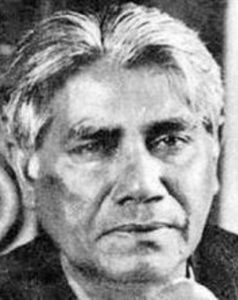 Akhtarul Iman
Akhtarul Iman
(Ak̲h̲tarulīmān)
1915-96
 Akhtarul Iman
Akhtarul ImanAkhtarul Iman (Ak̲h̲tarulīmān; 1915-96; also Akhtaruliman, Akhtar-ul Iman, Akhtar-ul-Iman) was born in Qila Patthargarh, Najibabad, in what is today Uttar Pradesh. He was educated at Delhi College and Aligarh Muslim University, where he came in contact with Progressive writers. After graduation, he worked in various capacities, including as a staff artist for All India Radio. In 1944 he joined Shalimar Pictures of Poona/Pune and was associated with the film industry for the rest of his life. He started writing poetry in 1933 and published eight collections, the most important being Girdāb (Whirlpool; 1940), Tārīk sayyārā (Dark Planet; 1946), Sab rang (All Colors; 1947), Āb-jo (Rivulet; 1955), and Yāden (Recollections; 1961), the last receiving the 1963 Sahitya Akademi Urdu Award. Confining his poetry in the main to the naz̤m, he considered himself a major bridge between the Progressives and the Modernists in Urdu poetry. Among his best-known poems are “Āzādī ke bād” (After Freedom), “Ek savāl” (A Question)* and “Ek laṛkā” (A Boy).*
He was a close friend and supporter of the highly controversial modernist poet Miraji (Muhammad Sanaullah Dar; 1912-1940), who, physically and mentally ill, lived with Akhtarul Iman and his wife, Sultana, during his last months before being confined to a mental hospital in Bombay/ Mumbai, where he died. For a touching account of Akhtarul Iman—himself seriously ill—narrating Miraji’s last days to researcher Geeta Patel, see her Lyrical Moments, Historical Hauntings: On Gender, Colonialism, and Desire in Miraji’s Urdu Poetry (New Delhi: Manohar, 2005) 76-80. See “Poems by Akhtarul Iman,” Mahfil: A Quarterly of South Asian Literature, 2:3 (1964) 36-38; Taking Stock: Selected Poems of Akhtar-ul-Iman, tr. Baidar Bakht et al. (1992) and Carlo Coppola’s interview, “Meeting Akhtarul Iman,” Speaking of/with/to/& about South Asian Writers: Interviews and Essays (forthcoming). A sixty-minute documentary, Akhtarul Iman, written and directed by Saeed Mirza, appears in the Sahitya Akademi’s Video Film Author Series.
Poetry
2. ʻAhd-i vafā / Pledge of Fidelity
3. Āzādī ke baʻd / After Freedom
6. G̲h̲ulām rūḥon̲ kā kārvān / Caravan of Enslaved Souls
17. Pas-i dīvār-i caman / On the Other Side of the Garden Wall
19. Sar-i rāh guzre / Along the Road
Yāden̲ (Remembrances). Dihlī: Panjābī Pustak Bhanḍār. 1963.

